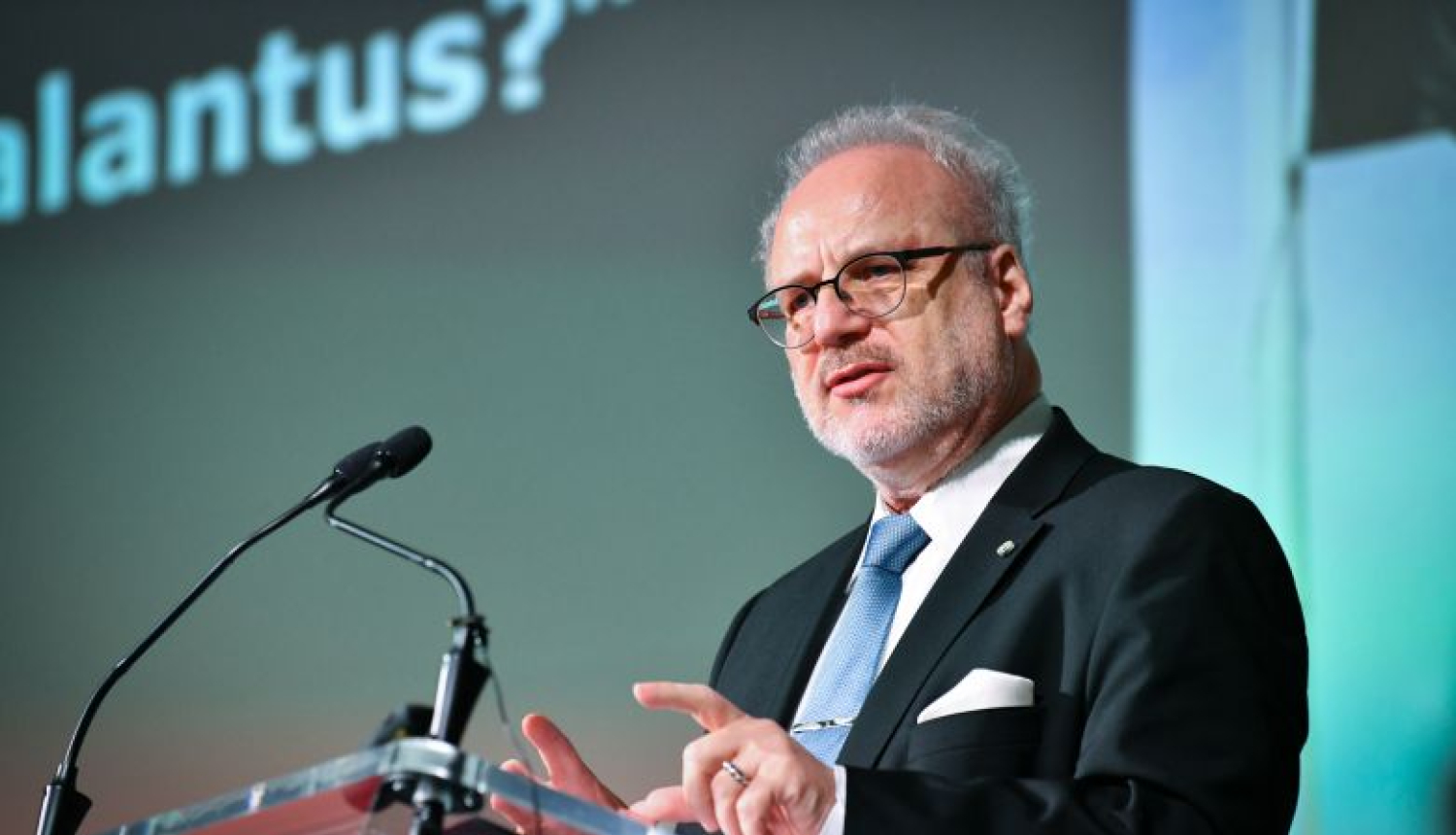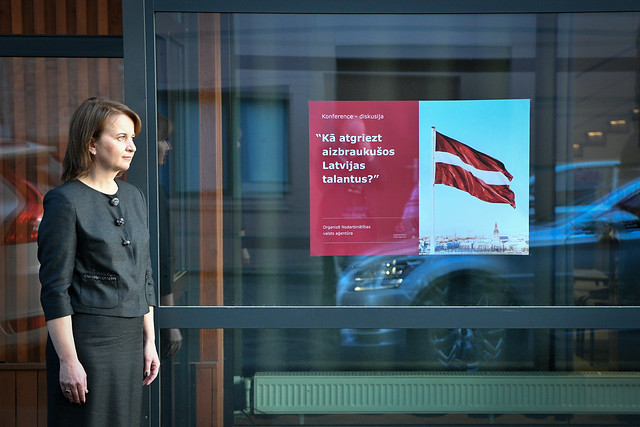Good morning, dear ladies and gentlemen,
Madam Minister,
After becoming the President of Latvia, I have met with many Latvians and Latvian families that have returned to Latvia. Not only from Riga, from regions too. Latvians who have returned are a part of Latvia’s society today. An important part of our society today. We are excited about every Latvian who has returned. They come back to open new businesses, revitalise abandoned farms. They bring back new and exciting ideas, and generally enrich our society, including rural communities. Yesterday I visited Bauska region where I met a young businesswoman who had recently returned from UK where she had spent several years studying. I think that people going abroad and coming back, or cross-border migration, is absolutely normal in this day and age. There is nothing to be fussy or angry about. It is good that people experience the world and travel to other countries, work in other countries, socialise with other cultures, experience their education systems because, when they return, they bring back wealth of knowledge that they can then put to good use here.
Why do we need policies? Because policies may encourage people to come back, which is the ‘re’ part of the ‘re-emigration’. Maybe emigration is not the right word because, when we hear ‘emigration’, the image that springs to our mind is one of a man or woman selling their house and ‘leaving everything behind’ to start new somewhere else as they did, for example, in the 19th or 20th century when many decided to go to the US for good. That is a classic example of an emigrant. Today’s world is different. If you take, for example, Europe, there is free movement of people – anyone can go and come as they wish. There are no borders because freedom of movement is one of the four fundamental freedoms of the European Union. It is one of the reasons and purposes for establishing the Union. Naturally, Latvians are also ‘riding the wave’. They go abroad and come back to Latvia as they choose. People here would, of course, benefit from everyone who has returned, and today’s conference is about encouraging those who want to return. And it is wonderful that State Employment Agency and Minister for Welfare, who is in charge of these matters, have put together such a great event. A discussion on how to bring people back to Latvia, instead of vice versa, letting them go.
So, how do we bring talent back to Latvia? There is no magic recipe. Experience of other countries also shows that well-coordinated national-level human resource policies are the best way to accomplish that. Especially now when we are experiencing an economic crisis caused by COVID-19. By the way, this crisis has also forced many more Latvians to consider moving back to Latvia because of the COVID-19. Interest in coming back has increased because Latvia’s statistics are, or at least were, significantly better than elsewhere in Europe. But it is crucial to have a long-term human resource policy, a consolidated policy document, which addresses all the different aspects that are correlated. In other words, availability of growth-oriented jobs based on local market needs is crucial for bringing these people back and attracting talent outside Latvia. If you look at unemployment statistics for Latvia, you will see that on average Latvia is doing better than the rest of Europe. That is one. Then there is also the shortage of labour in many sectors. It is also important to understand and take into account that there is lack of skilled labour or technically skilled workers, which is not so bad because we can solve skills issues through interventions of the Ministry of Education and Science and, of course, Ministry of Welfare. Skills shortage can be addressed efficiently. By addressing skills shortages of our workforce, we can also address various future challenges in our economy and ensure that Latvia has skilled labour required to successfully compete and collaborate with other European Union member states. We do not have oil deposits, there is no coal here. But we do have people. Strong, talented people. Human capital is the fundamental asset of the Latvian state.
We must also continue to reduce the income gap between Latvia and other developed countries. However, if you talk to Latvians who have recently returned, you will quickly learn that salary is not the only consideration here. You must, of course, consider the cost of living, which is considerably higher outside Latvia, but there are also other reasons why people return, such as sense of belonging. I think it is about culture, identity and language. We are free to move to other countries, and we are keen to choose those countries that have similar social model as us. Countries where democracy and rule of law are respected. But Latvianness is also a very important factor. Many Latvians come back because they need the sense of belonging and want to feel really at home compared to other countries of residence. That somehow makes up for lack of higher salary, which still is a notable issue. All things considered, we need human resource policy, which is strongly linked to economic policy. For years our competitive advantage compared to other European countries was cheap labour. However, rising labour costs mean that we are losing this advantage fast or have lost it completely already. Skilled labour is no longer cheap in Latvia. All economic sectors must gradually bring their wages up to reduce the gap between Latvia and other countries. And maybe our salaries will catch up with the rest of Europe in the coming decade.
The biggest wave of migration and most intense period of emigration from Latvia was recorded in 2008–2010. It was triggered by global crisis that left many people jobless. Today we are in an entirely different situation: many Latvian sectors need extra workers, whereas back then there were many people, who wanted to work but could not find job. And it was only natural that many of them looked for job opportunities outside Latvia. If we look at current statistics, we can see that the number of people returning and leaving is almost the same. For example, in 2018 (and I do not have more recent data, maybe Mr Auers or Mr Strautiņš can give you more recent data) five thousand Latvians came back to Latvia. Five thousand is an impressive figure. These are people who bring back valuable work or training experience. There is still a little deficit but estimates of Ministry of Economics suggest that we will ‘break even’ around 2023. By the way, Estonia has been having ‘surplus’ for several years now. There are more people returning to Estonia than leaving it. Estonia, of course, is sometimes presenting things in a better light, but there is also statistical evidence suggesting that Latvia does indeed lag behind it in this regard. However, if Estonia can do it, then we should also be capable of doing it. We just need to give it a little nudge.
There are several measures that can be implemented to promote re-emigration. But the most important and primary one is ensuring that a targeted human resource policy is adopted. That is key to, so to say, hit two birds with one stone. The topic of today’s conference is how to encourage more people to return to Latvia and, more importantly, ensure that skills of local workforce match the labour market needs. I believe this is our biggest challenge. We need to overcome it to become fully integrated into European and global economy. We need workforce with adequate skills. And we are not talking here about any skills. We need highly skilled people. It takes many years to learn those skills. It is not that easy to acquire them. And pay must also be adequate. That should be the main aim of such human resource policy.
So, who should be responsible for development of this integrated human resource policy? I think that the whole government should take charge. It would be nice if Cabinet of Ministers prepared an information note on human resource policy. Give us an overall vision and determine the role of each institution. And Ministry of Economics and Ministry of Welfare would then oversee its implementation.
I believe that this is something that participants of the conference will discuss and share their experiences about. Of course, there are several dimensions of human resource policy, and I do not mean to underestimate the importance of removing barriers hampering re-emigration. There, indeed, are obstacles to coming back. Starting from minor issues like registering, finding accommodation and school for children. Re-integration of children with Latvian as their second language by offering them refresher training. I believe there are good ways for addressing diaspora or rather human resource policy needs on a broader level. There are good initiatives, for example, regional coordinators that are responsible for assisting and coordinating those who return to their region. We need to strengthen these efforts. There are best practices too. For example, in Portugal, Spain, Italy, which used to be countries with traditional emigration right up to 90s. Many people from these countries went to other European states. Mostly France, Benelux countries and Germany. So, they had to come up with a consolidated human resource and diaspora policy. And that is what we have been doing for the past couple of years as well. There are good examples, but we cannot just replicate them. Each country is different, and we need our own diaspora and human resource policy. No ‘copy/paste’. We need to find what fits us the most.
So, today you will talk about ways of bringing talent back to Latvia. It is important for our growth and social development, which is crucial for all citizen of Latvia. Once again thank you for organising this conference to talk about new ways of solving this problem at an individual and collective level.
Thank you for organising the conference. I hope you will have a fruitful and insightful event.





